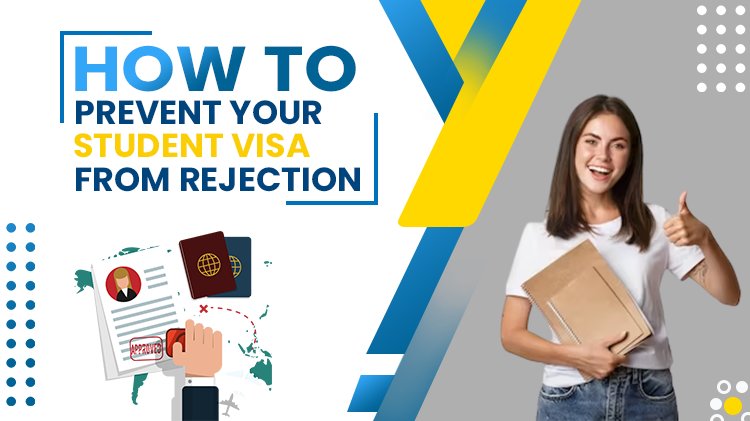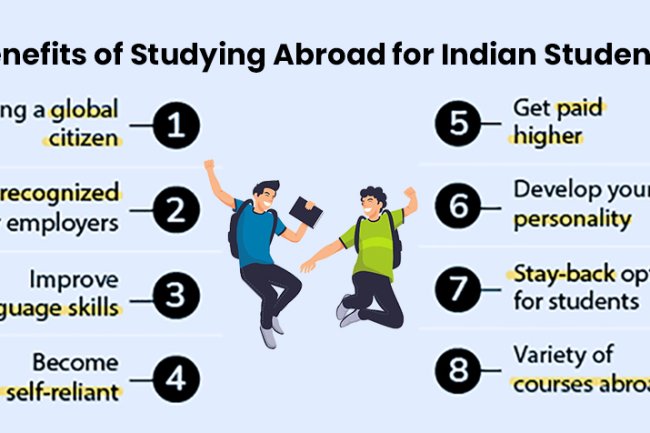How To Prevent Your Student Visa From Rejection
To prevent your student visa from being rejected, it's essential to thoroughly prepare and present a strong application. Here are some tips to increase your chances of getting your student visa approved:

A visa refusal might be frightening, but with careful planning and preparation, you can boost your chances of success.
To begin, completely understand the visa requirements of the nation in which you wish to study. Each country has its own set of requirements for candidates, such as financial verification, health insurance, and acceptance into a recognized educational institution. Before applying, make sure you are well-informed about the required documents and that they are in order.
Next, properly arrange your documentation. Submit complete and up-to-date information, such as financial statements, academic transcripts, admission letters, and other pertinent documentation. A well-organized and thorough application might make a favorable impression on the visa officer.
Demonstrate strong ties to your home nation to demonstrate your want to return after finishing your studies. Display proof of family, property, or work obligations that will require you to return home after your schooling is over. This reassures the immigration officer that you are a genuine student pursuing educational opportunities overseas, rather than someone intending to permanently immigrate.
Create a persuasive statement of purpose that highlights your educational ambitions, professional goals, and reasons for selecting the specific educational institution and country. Explain how this opportunity fits with your future goals and how you want to contribute to your native nation after finishing your studies.
Seek advice from expert advisers or education consultants who can provide significant insights and assure the accuracy of your application. They can guide you through the complicated visa application procedure and handle any issues you may have.
Finally, apply for the student visa as early as possible to avoid a last-minute rush and stress. Timely submission allows for adequate processing time and timely resolution of any potential concerns.
Reasons For Student Visa Rejection
Obtaining a student visa is an important step in pursuing higher education overseas, and avoiding visa rejections is key to a successful end. You can improve your chances of obtaining a visa by being aware of typical causes for rejection and taking proactive actions to resolve them. Some of the most common causes for student visa denials are:
1. Incomplete Or Incorrect Documentation: Ensure that all required forms and supporting papers are correctly filled out and meet the specific requirements of the visa application.
2. Inadequate financial resources: Provide appropriate proof of financial capability to fund tuition and living expenses, such as bank statements, sponsorship letters, or scholarship documentation.
3. Lack of true intent: To answer concerns about prospective immigration intentions, clearly describe your genuine educational ambitions, job aspirations, and relationships to your home country.
4. Failure To Meet Health and Security Requirements: Ensure that you meet the visa authorities' health and security standards and produce any relevant medical or police clearance certifications.
5. Inadequate academic preparation: Meet the academic requirements of the educational institution or program to which you are applying and give proof of your educational qualifications.
6. Language proficiency: Pass language proficiency examinations such as IELTS to demonstrate sufficient fluency in the language of teaching, such as English or French.
7. Interview misbehavior: Maintain a professional manner during the application and interview process.
Examining the visa criteria thoroughly and seeking advice from specialists will help you handle the application process effectively. Educational counselors, immigration professionals, or the embassy/consulate can provide useful insights and support to address potential difficulties, increasing your chances of obtaining a student visa. Proper planning, attention to detail, and a real commitment to your educational goals can all contribute considerably to a successful visa outcome and an enriching study abroad experience.
Tips To Avoid Student Visa Rejection
Obtaining a student visa is an important step for international students who want to study abroad. A visa refusal might be frightening, but with careful planning and preparation, you can boost your chances of success.
Apply Early: It is critical to submit your visa application as soon as possible. Visa processing times might vary, and visa officers are sometimes overwhelmed during the admissions season. Applying early gives for adequate processing time and timely resolution of any potential concerns.
Double-Check Your paperwork: Make sure you have all of the necessary paperwork for your student visa application and go over them thoroughly. Any missing or incorrect information may result in visa denial. A valid passport, letter of acceptance from the educational institution, financial statements, language proficiency exam results, and any applicable medical or police clearance certificates are all common documents required.
Provide English Proficiency Evidence: Depending on the country, you may be required to produce language proficiency exam scores, such as IELTS or TOEFL. Make sure you have the relevant language skills and supply the proper documentation. Preparing for and taking language proficiency tests ahead of time can allow you enough time to retake the test if necessary.
Document Your Academic Qualifications: Ensure that all of your academic qualifications, including transcripts, degrees, and certificates, are correctly documented. To support your application, provide correct and authentic facts. Consider having your documents translated by a certified translator if they are not in English.
Demonstrate the Funding: One of the most important criteria in visa clearance is demonstrating that you have the financial means to support your tuition and living expenses while overseas. Proof of money should be detailed and reliable, such as bank statements, sponsorship letters, or scholarship awards. It is critical to demonstrate that you have sufficient cash for the duration of your studies.
If an interview is required as part of the visa application procedure, prepare thoroughly and answer questions truthfully and confidently. Prepare to explain why you want to study abroad and why you want to return to your native country when you finish your studies. Visa officials want genuine students who are dedicated to their academic goals and plan to return home after graduation.
Explain Your Reasons Clearly: Explain why you choose the specific nation, course, and school in your Statement of Purpose (SOP) or visa letter. Highlight how it relates to your academic and professional aspirations. A well-written SOP demonstrating your firm intent and goals can have a big impact on the immigration officer's decision.
Follow the SOP or Visa Letter Guidelines: Pay special attention to the instructions for writing your SOP or visa letter. Structure it correctly, address all needed elements, and reread it thoroughly before submitting it. An SOP that satisfies all of the requirements and is error-free demonstrates your attention to detail and dedication to your application.
Seek Professional Help: If you are feeling overwhelmed or unclear about the visa application procedure, contact with educational counselors, immigration professionals, or the embassy/consulate. They can provide useful information, handle any problems, and guarantee that your program is error-free.
Be Consistent and Patient: The visa application procedure might take time and may include waiting for responses or extra papers. Be patient and persistent throughout the process, and keep in touch with the appropriate authorities to maintain track of the status of your application.
What to do if your student visa is denied
If your student visa application is denied, you may have a difficult time. However, you can address the situation by doing the following steps:
Examine the Rejection Grounds: Carefully examine the visa authorities' rejection letter or communication to understand the specific reasons for the visa denial. This can help you discover areas that need to be improved for your future application.
Seek Professional Advice: Seek advice from an immigration lawyer or a visa consultant who can provide insights and knowledge. They can assist you in understanding the reasons for rejection and provide crucial recommendations on how to improve your application.
Rectify the Issues: Once the reasons for rejection have been discovered, take aggressive actions to rectify them. This could include acquiring more supporting documents, upgrading your financial documentation, developing relationships to your home nation, or boosting your language skills.
Reapply with an Improved Application: If you decide to reapply, make sure you have addressed the flaws that led to your rejection. Examine your application carefully, double-check all documents, and submit any additional information or evidence that can help your case.
Be Patient and Persistent: The visa application process can be difficult, and rejection might be discouraging. It is critical to be patient and persistent. Learn from the experience, make the required modifications, and proceed with confidence to your next application.
Consider Other Study Options: If you have received several rejections from the same country, it may be worthwhile to look into other study options. Investigate other nations that have comparable educational options and have more lenient visa requirements.
Maintain a Positive Attitude: Rejections are a natural part of the process, so it's critical to be upbeat and hopeful. Keep in mind that every visa application is different, and there are no promises of approval. You can improve your chances of success by thoroughly resolving the flaws that led to the rejection and submitting a solid and well-prepared application.
Seek Help from Your Educational Institution: Contact the international student office or advisors at the educational institution where you intend to study. They may have dealt with visa issues before and can provide assistance and help throughout the process.
Keep Up to know on Visa regulations: Stay up to know on changes in visa regulations and criteria for the nation you want to study in. Staying knowledgeable about immigration restrictions might help you design your application correctly.
How do backlogs affect your visa application?
Backlogs, which are unfinished or pending courses or subjects from prior academic years, might have a substantial impact on your visa application for studying abroad. While the specific ramifications may differ depending on the country and immigration regulations, recognizing the broad implications is critical for a successful application process.
Delayed Processing: If you have backlogs in your academic record, your visa application may be delayed. Immigration officials may want more time to consider your application, particularly if they need to assess your academic standing and progress.
Examining Academic Performance: Backlogs can call into doubt your academic talents and dedication to your study. To determine your eligibility for a student visa, visa officers may extensively review your academic records. Clear explanations and evidence of your efforts to enhance your academic performance can help your argument.
Financial Consequences: Backlogs may jeopardize your eligibility for financial aid or scholarships. Some universities or scholarship sponsors may have stringent academic performance standards, and backlogs may harm your chances of receiving financial assistance. Check the prerequisites of the study abroad program as well as any scholarships you're applying for.
Additional Documentation or Interviews: Depending on the severity of your academic issue, you may be requested to give additional documentation or attend interviews to clarify your academic position. This could include backlog explanations, a thorough completion strategy, or letters of reference from academics.
Increased Scrutiny on Intent: Increased Intent Scrutiny: If you have a backlog, visa authorities may pay closer attention to your intents and motivations for studying abroad. They may want to know that you are sincerely committed to your studies and that you have a clear plan for managing and resolving the backlogs. Their anxieties can be alleviated by demonstrating a solid academic and career strategy.
It is critical to understand that, while backlogs can cause alarm, they do not always result in visa rejection. Each application is evaluated individually, taking into account variables such as general academic record, reasons for backlogs, efforts taken to rectify them, and supporting material submitted.
To increase your chances of a successful visa application despite backlogs, follow these steps:
1. Clear the Backlogs: Make a concerted effort to finish any outstanding courses or subjects. Consider retaking exams or obtaining further assistance from professors or tutors to demonstrate your dedication to academic advancement.
2. Create a Strong Statement of Purpose: Explain the causes for the backlogs, the efforts you've done to overcome problems, and your strong motivation for studying abroad in your statement of purpose.
3. Provide credible academic references: Obtain letters of recommendation from professors or academic advisors who can attest to your academic potential and dedication.
4. Provide Evidence of Progress: Include evidence of better grades or completed coursework to demonstrate your commitment to academic success if you have made progress in resolving the backlogs.
5. Seek Professional Help: Seek advice from education consultants or advisors who have experience with visa applications. They can assist you in properly presenting your case and addressing any potential problems.
Conclusion
You may dramatically boost your chances of success by using these methods and being proactive in your student visa application process. Remember to thoroughly grasp the requirements, gather all required documentation, present authentic and persuasive explanations, and seek professional advice if necessary. You can improve your chances of obtaining a successful student visa and beginning your educational journey abroad with careful planning and attention to detail.
If you require assistance with your visa application, try contacting a reputed foreign education expert such as university bureau. Our knowledgeable advisors can offer important advice throughout the application process, assist you in correctly filling out the visa form, and ensuring that you make a persuasive case to the immigration authorities. They may also keep you up to date on any changes in visa restrictions and criteria, making the application process even easier for you.
Remember that applying for a student visa is an important stage in your study abroad adventure, and putting in time and effort to prepare a great application can have a big impact on its success. By working hard and seeking expert help when necessary, you can increase your chances of receiving the visa and fulfilling your dream of studying abroad. Best wishes with your application!
What's Your Reaction?





















